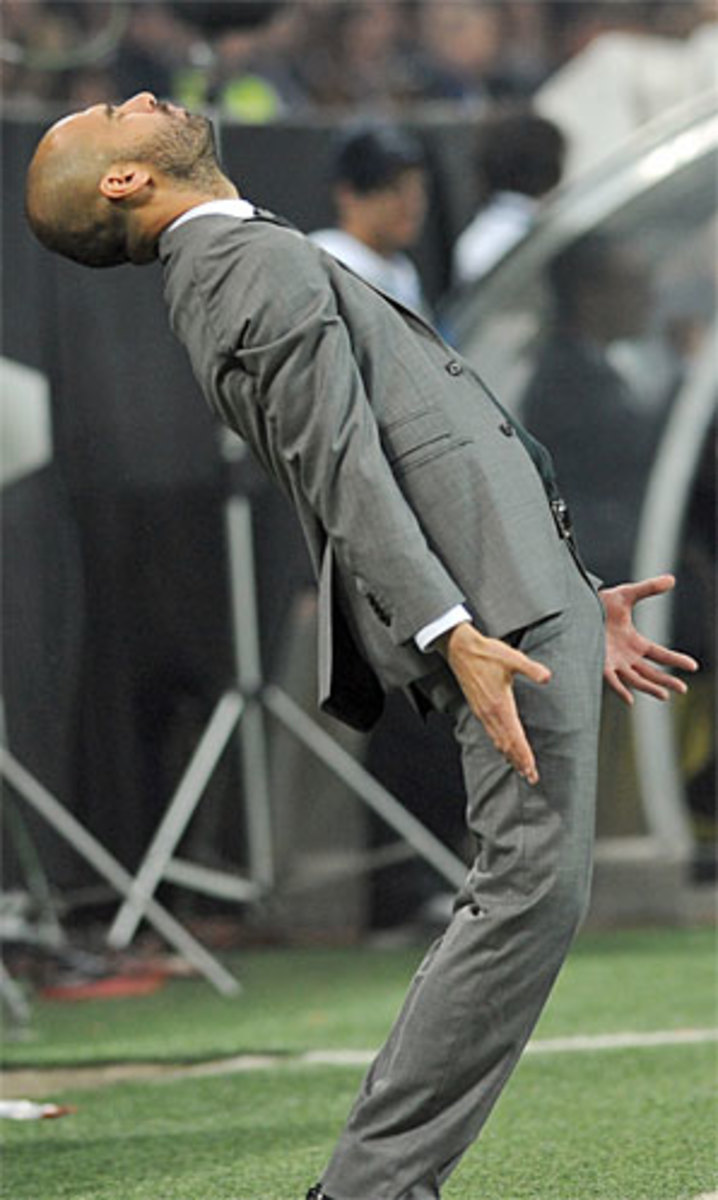Defeat to Mourinho's Inter remains a bitter pill for Barca to swallow
It's the ultimate in gloating -- the traditional song that really, really rubs it in and stings like hell. You've traveled miles and miles to watch your team but hope has turned to despair, all you've eaten is a ropey sandwich at a service station and all you've drunk is a bottle of warm Coke that's long since gone flat. Which might not be a bad thing, because there's no way you're trusting your backside to that toilet.
Your team is getting hammered, the referee has robbed you blind, it's pouring with rain, and the only thing awaiting you now are the unwelcoming arms of a dark, dangerous highway. It has cost you a fortune. And then those antagonists start singing. "You came all this way ..." they laugh, like you didn't already know.
"... and you lost!"
Soaked in schadenfreude, English football fans have been singing it to each other for years. But rarely has there been a better opportunity to give it a European outing, to reach for the dictionary and render it pleasing to the Italian ear. Or displeasing to the Catalan one, hasfet cami per no res, perhaps. The longest journey a soccer fan in England can make is probably Newcastle to Plymouth, at 525 miles, the longest in the top flight, Sunderland to Fulham -- a mere 250 miles. This week, Barcelona traveled 612 miles. By road. With the Eyjafjallajokull volcano grounding flights all across Europe, Barcelona traveled by coach, from Spain to France to Italy, to face Inter Milan. They went all that way ... and they lost.
They didn't just lose. They lost in a fashion that was very, very hard to take. The team that won everything there was to win -- La Liga, Copa del Rey and European Cup; Spanish Super Cup, European Super Cup and World Club Cup -- lost a Champions League semifinal, the first step on the ultimate trip: a triumphant march to the final at the Santiago Bernabeu, home of bitter rivals Real Madrid. And they lost to Jose Mourinho, the man they love to hate, the former Camp Nou translator turned infuriatingly successful football coach and masterful wind-up merchant; the man who might be on his way to Madrid -- both for the final of this season and the start of next. To judge by the Spanish capital's press, the European Cup semifinal's real role is as audition for the Madrid job.
Worse, Barcelona lost 3-1 -- the first time it's been beaten by more than one goal since Pep Guardiola took over. Barca were "robbed" by the referee, who allowed an Inter goal that looked offside; another Inter goal that started with a "foul" on Leo Messi (laying bare the difference in refereeing in Spain and in Europe); and failed to give Barca a penalty for a wild lunge from Wesley Sneijder on Dani Alves or a nudge on Gerard Pique. Sport's cover called it "Italian theft," El Mundo Deportivo splashed on "stick up," and both papers -- who last year maintained a suspicious silence after the controversial semifinal with Chelsea -- insisted that the Portuguese referee, Olegario Bequerenca,who officiated the game and Mourinho have been "friends" for a decade.
But perhaps most fundamentally of all, for all that the press complained about the man in black and Barca's players were seething, the visitors deserved to lose. Deep down, they probably knew that -- the sense of impotence as well as injustice fueling their despair and anger.
Barcelona dominated possession -- every Barca player who played 90 minutes completed more passes than every Inter player -- but was vulnerable at the back, surprisingly sloppy in midfield, where Sergio Busquets was as wasteful as he was weak, and nonexistent up front. Messi was crowded out and dropping deep. Pedro scores goals and is an intuitive player with great anticipation but has little presence. And as for Zlatan Ibrahimovic, he ran the same distance as Victor Valdes. Yes, the goalkeeper. It's hard to avoid the conclusion that whereas Barcelona had three out-and-out attackers last year, this season it has none. Messi is incomparably brilliant but more of an all-arounder, Thierry Henry is an ex-footballer and Samuel Eto'o was playing for the other side.
Ibrahimovic was not alone. Apart from Carles Puyol, every Barcelona player ran less than against Arsenal. There was a lack of sharpness about them. The ball was moved slower than normal, and there was an inability to withstand Inter's pressure and physicality. All of which invites an obvious, if tentative conclusion. The coach journey was no National Express, cramped, hot and uncomfortable, and Barca said it was no excuse, but maybe it did make a difference. Guardiola has insisted on traveling the day of the game in order to avoid fatigue -- both mental and physical. Three days away is quite a difference.
The question now is whether things will improve in the second leg; whether the fury, fueled by the "translator and his friend," that replaced the initial fatalism can propel Barcelona to a comeback. Will things be better, both in red-and-blue and in black?
"I hope we play better next time," Ibrahimovic said.
Said Pique: "I hope we get an impartial ref next time."
After the game, Xavi Hernandez clashed with Mourinho in the tunnel, the Barcelona midfielder complaining about the referee. "Which ref do you mean?" Mourinho asked, a glint in his eye, "the one from Stamford Bridge last year?" Incensed and defeated, Xavi beat a hasty retreat. Delighted and victorious, Mourinho made his way to the press conference, where he was able to play the perfect card: a magnanimous, moral superiority that could only have wound up Barca even more.
"I understand Xavi," the Inter manager said, smiling. "After all, when you're not used to losing, it can be hard to lose."
And when you've gone all that way, it can be even harder yet.






